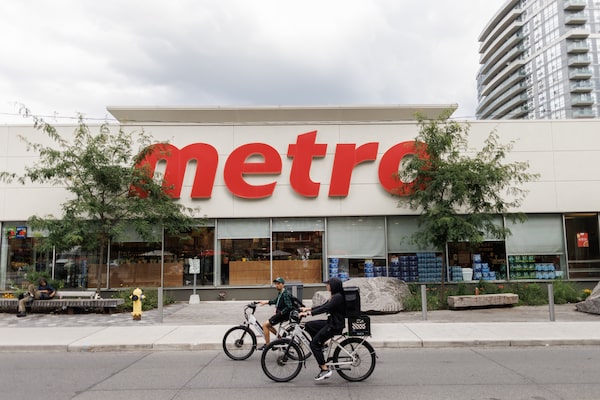
A Metro grocery store in Toronto on July 18. Metro is seeking punitive damages and legal costs from George Weston, Loblaw, Weston Foods and Weston Bakeries.Cole Burston/The Canadian Press
Grocery retailer Metro Inc. MRU-T has accused competitor Loblaw Cos. Ltd. L-T and its parent company of misleading law enforcement and the Canadian public, by claiming an “industry-wide” scheme existed to fix bread prices for more than a decade.
While Metro has previously denied any knowledge of or involvement in such a scheme, this is the first time it has so explicitly accused George Weston WN-T and Loblaw of conspiring to falsely implicate other companies in price-fixing arrangements. Loblaw denied the accusation.
On Tuesday, Metro served a statement of defence and crossclaim to other parties in a class-action lawsuit against the largest producers and retailers of packaged bread in Canada. The lawsuit, filed in the Ontario Superior Court of Justice, stems from Loblaw and its parent George Weston Ltd.’s admission that the companies were part of a conspiracy to artificially raise the price of bread between 2001 to 2015.
The disclosure implicated other major grocery retailers such as Metro, Walmart WMT-N, Sobeys and Giant Tiger, all of whom have denied violating competition law. It also implicated the country’s largest bread producers, Weston Foods (which George Weston controlled at the time) and Canada Bread.
The federal Competition Bureau launched an investigation into the matter in January, 2016, which is continuing. In June, Canada Bread agreed to pay a $50-million fine to settle its part of the investigation. Separately, class-action lawsuits were launched in Ontario and Quebec, claiming consumers were entitled to damages as a result of the scheme.
In the court document served on Tuesday, Metro argued that Loblaw knew it would take a significant and irreversible hit to its brand reputation if it were revealed to be the only retailer participating in a bread price-fixing scheme, which could include shoppers deciding to boycott its stores. It argued that Loblaw and George Weston conspired “to falsely implicate other entities, including Metro, in their alleged cartel,” partly to alter public perception of the scandal and also to disperse “potential civil liability,” such as damages from lawsuits, to other companies in the industry.
None of the claims have been tested in court.
“Metro’s allegations are simply ridiculous and utterly untrue, as will be made clear in court,” Loblaw spokesperson Catherine Thomas wrote in an e-mailed statement on Tuesday.
The class-action lawsuit was filed in Ontario in 2017, and certified in 2021. It is seeking punitive damages on behalf of people and entities in Canada (outside of Quebec) who purchased packaged bread from the defendants from Nov. 1, 2001, until the present.
It names as defendants Canada Bread, its former majority owner Maple Leaf Foods and its current parent company Grupo Bimbo; Loblaw, George Weston and former subsidiaries Weston Foods and Weston Bakeries; Sobeys and its parent company Empire Co. Ltd.; Metro; Walmart Canada and its U.S.-based parent company; and Giant Tiger. A statement of claim filed in the case says that the defendants were “unjustly enriched” by the scheme, and caused Canadians to pay more for packaged bread than they should have.
It also argues that Maple Leaf benefited from the $1.83-billion sale of Canada Bread to Grupo Bimbo in 2014, contending that the sale price was driven higher by the revenue that the price-fixing scheme generated. Maple Leaf has also denied any wrongdoing by Canada Bread or its senior leadership at the time.
In the new court document, Metro criticized the claims in the lawsuit for “oversimplifying the economics” of the grocery retail sector, and countered that the retail market for packaged bread in Canada “was competitive and inherently dynamic at all relevant times.”
For example, Metro’s filing states that grocery-store owners discuss competitors’ prices with their suppliers as part of the normal course of business to push for “equitable treatment” when food manufacturers and other suppliers ask for price increases.
Retailers also negotiate what is known as “promotional spend,” where suppliers agree to provide rebates when retailers offer items on discount to their shoppers. During the period covered by the lawsuit, Metro “frequently and vigorously negotiated” with suppliers for these promotions, the filing stated, which “increased competition in the retail market and had the direct consequence of lowering the retail prices paid by the public” for bread.
Metro’s filing stated that the company did not participate in any price-fixing scheme, and asked for the action to be dismissed with costs.
Metro’s filing also stated that the plaintiffs’ “misguided characterization of the retail packaged bread market” were apparently based on statements by George Weston, Loblaw, Weston Foods and Weston Bakeries. Metro is seeking punitive damages and legal costs from those companies, and accused them of “public mischief” in reporting offences to law enforcement that had not been committed, resulting in “significant and unjustifiable damage” to Metro’s reputation.
Editor’s note: A previous version of this story stated that Metro’s statement of defence and crossclaim was filed with the Ontario Superior Court of Justice as part of the class-action lawsuit. Metro has served the document to other parties in the case, and says it intends to file the document with the court in the coming weeks. This version has been updated.
 Susan Krashinsky Robertson
Susan Krashinsky Robertson